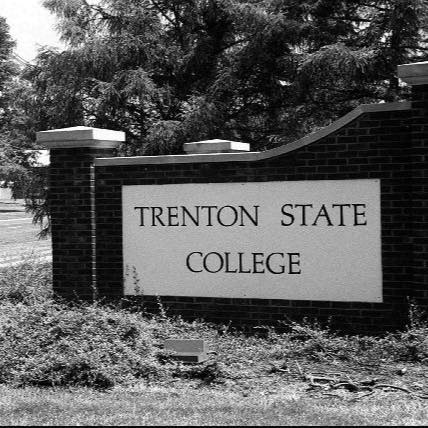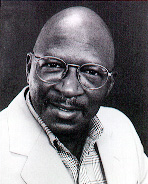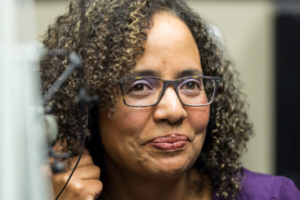AAS
Timeline
On April 4, 1968, Marin Luther King Jr. was assassinated in Tennessee. The outpouring of grief and anger added impetus to a growing demand for Black Studies Programs so that students could learn history that had been suppressed. The first program was created later that year in San Francisco and inspired other students across the country to protest for Black Studies Programs.

African American students at Trenton State College created a list of 10 demands and presented it to the President of the College, Robert Heussler. These demands included the creation of the Afro-American Studies program, hiring Black entertainment, removing the ability for campus police to discriminate against Black students, naming a dorm building after a prominent Black woman, being represented in college advertisements, increase the number of Black students enrolled in the college, and having a space on campus dedicated to Black students.

The Afro-American Studies department was approved and set to begin in the fall of 1970. The original chair of the department was going to be John Hatchet. However, Hatchet made national news for the way he disagreed with school officials in a school in New York. Through a series of controversial decisions done by the college administration, Hatchet was hired and then fired for the job over the summer.
Following the creation of the Afro-American Studies department, Dr. Frank Myers begins to bring together multiple classes in order to create a minor for black studies. During this brief period, Myers acts as chairman for the department, but resigns from the position in 1973.
Officially effective in September, 1972, the name of the department is changed from Afro-American Studies to African American Studies. The current chairman of the department is Dr. Myers, and the minor currently has 14 classes, with 8 of the classes being taught in the department. The other 6 classes are cross listed between Educational Foundations, Elementary and Early Childhood Education, English, Psychology, and Sociology.

Donald Evans had been working at the college since 1972. He was the Director of the Minority Executive Council, and was tasked with evaluating and implementing programs related to the needs of minority members of the college community. In 1973 he became the department chair of the African-American Studies (AAS) department. As a professor he taught courses in English, African American Literature, playwriting, drama and jazz. Evans is one of the founding members for the AAS and is a crucial figure in TCNJ history for breaking down racial barriers and helping everyone have a better understanding of African American culture. Outside of the college Evans, was a known playwright and an important contributor to the Black Arts movement of the 1970s. Evans won several fellowships in playwriting from the National Endowment for the Arts and other organizations.
In 1972, Dr. Stephen Chukumba arrived at Trenton State College, where he structured the African history program and became one of the founders of the Afro American Studies department alongside Don Evans and Gloria Dickinson. After coming to the United States as a diplomat from Mbaise Nigeria, Chukumba sought out to develop the history aspect of African American studies and educate African Americans about their history. The first time he taught African American history was at Gallaudet College, a school for the deaf, where he stayed for two years. He was also a member of a number of civic and cultural organizations, including the Ummuna Club, American Federation of Mbaise Associations of Ummuna, Chokoneze Improvement Union and Knights of Columbus. Dr. Chukumba retired from the college, leaving the department in 1999, where Christopher Fisher then took over as Chair of the department. Dr. Chukumba sadly passed away on October 15th, in 2012. He will always be beloved by the Trenton State community and will forever be remembered for his large contributions to the current African American studies department
At the end of the spring semester the college formed a committee to investigate claims of racism and solutions to improve the college. Late October the committee announced the formation of the Minority Executive Council. The goal of this committee is to implement administrative procedures and programs related to the needs of the minority students on campus. This committee still exists and remains committed to its original goals.
On October 2, 1972, the first issue of Utimme Umana: La Voz Oculta is published. Utimme Umana, meaning “Rebirth” in Swahilian, was the name of a black students’ newspaper that had failed to gain footing in the year prior. In honor of the previous paper, and the inclusion of spanish and puertorican students in the current paper, the name also took on “La Voz Oculta”, meaning “The Hidden Voice ''. The paper’s defining goal is to combat ignorance on the topics of race, and encourages the readers to to help spread the word.
In 1973, Fire II began its publication at Trenton State College. It is named in honor of the Negro Renaissance magazine, Fire, which started publication in the summer 1926. It ended its run because of “hassles ranging from financial difficulties to collecting articles.” Fire II sought to continue the goals of its predecessor in covering the stories that go unnoticed by more established news organizations. The articles include poems, stories, photos, and plays, and is advised by Donald Evans.
Ntozake Shange, born Paulette Linda Williams, began working with Trenton State College during 1972 in the English department, teaching freshman seminar courses and Poetry. In 1976, her first theater piece debuted in Booth Theatre, a collective of 20 seperate poems featuring song and dance, named For Colored Girls Who Have Considered Suicide / When the Rainbow Is Enuf. This play coined the term “choreopoem.” Her play is currently on Broadway and have performances running until June 5, 2022.
James Chambers was hired by the college in 1976. He obtained his bachelor's degree in psychology from Trenton State College in 1974, earning his masters degree in enthnic studies from Atlanta university in 1979, and going on to pursue his doctorate degree in compensatory education with an emphasis on educational psychology at Rutgers university. At TCNJ, he served as an academic advisor and the assistant director for Project Chance. He has been involved in this program at two levels, as a student through the program and now as a staff member. As a student he was assisting other staff members in recruiting, enrolling, tutoring,and advising as a peer counselor. Chambers was the director of TCNJ’s College Bound program which prepared underachieving high school students from abbot schools and highly distressed municipalities for college. He was honored with an executive award from Metropolitan Trenton African American Chamber of Commerce at a program called “Building a Strong Community Together”. Dr. Chambers is a co-author of a poetry book called, "Hope for Humanity," and had his poem “Owen Dodson” Not Household Name, featured in Fire II in 1978.

Dr. Gloria Harper Dickinson, originally an educator in Trenton State College's English department, joined the African American Studies department in 1973 where she served as an Associate Professor teaching courses on Africana Women's history, Religious Traditions in the African Diaspora and Womanist Theology. She also served as the chair of the department. From 2001-3, she was president of the Association for the Study of African American Life and History. As a member of the Alpha Kappa Alpha Sorority Dr Dickinson served as the incorporated international secretary from 1998 to 2000 and also as the international regional director from 2006 to 2008. Additionally, she was the faculty advisor for Zeta Sigma Chapter and served as the first president for the newly chartered Pi Mu Omega Chapter in Willingboro New Jersey. She was known for mentoring students and faculty to explore the inner workings of African American struggles and achievements and she conducted programs for students, military personnel, academics, and Foreign Service officers.

Dr. Fisher is a member of the History department faculty whose scholarly interests are in 20th-century American diplomacy, the Cold War, and Race Politics in the United States. He joined the College faculty in 1999, teaching courses in African American history. He was the interim chair of African American Studies for the 2001 year and then was chair again from 2007-2010. Fisher still remains affiliated with the African American Studies department.

Dr. Williams was hired in 2002 and is an Associate professor for both English and African American Studies. She is the current chair of the department and has been since 2020. One of her biggest contributions to the African American Studies department is assisting with getting the major approved. Currently she teaches a variety of classes that blend together such as English and African American history and has also had a book published in 2010. It is published by SUNY Press and is called “Re-presenting Segregation: Toward an Esthectics of Living Jim Crow '' and is co-edited with Brian Norma.

In 2003, co-founder and former chair of TCNJ’s Department of African American Studies Don Evans had unfortunately passed away. Many admired his work and many contributions to African American Studies, the arts, and the humanities over a career of three decades at TCNJ. He is forever remembered through the memorialization of his name on the Don Evans Black Box Theater in Kendall Hall and the creation of the Donald T. Evans Memorial Endowment Fund that helps support students who are experiencing financial challenges while attending TCNJ.

In 2007, the AAS department relocated from Kendall Hall to the Social Sciences building. This was partly due to Fisher’s mentorship of the criminology department. Fisher also wanted the faculty to be in a more prominent spot on campus since the department is involved with liberal learning for all students on the campus.

In 2009, longtime faculty member of the African American Studies department Dr. Gloria Harper Dickinson had passed away. Dickinson's numerous contributions towards African American Studies such as analyzing the popular culture and cuisines of Diaspora people; the literature, history, and contemporary activities of women of African descent would be forever valued by many of her peers and students in the AAS department. Later in the year of 2009, the Gloria Harper Dickinson lecture series was established to honor her legacy as a founding member and past chair of TCNJ’s African American Studies Department. These series of lectures heavily focused on scholarly works and intellectual activity consistent with Dr. Dickinson’s interest in Africana women, African diaspora cultures, and in strengthening African American civil society. A tribute on campus was made to her, which features a bench, commemorative plaque, and a white oak tree.

After many years since the inception of the department, the year 2001 involved both Professor Christopher T. Fisher and Dr. Winnifred Brown-Glaude beginning to write and revise many documents in order to receive approval from the college to create a major involving African American studies. There were many challenges faced on the path of the major's creation with most notably having the major being approved by the New Jersey state legislature rather than only The College of New Jersey itself. After many cycles of rewriting over the course of one year, the major was finally approved by the state and was made as an available major in 2016.
Our Core Values
The African-American studies department looks at the history, experience, and the culture of people of Africa and African-Americans. The department examines how those who were taken from Africa evolved over time in America as well as viewing how Africa evolved as a consequence of their absence.
CONTACT
African American Studies Department
Social Sciences Building Room 317
P.O. Box 7718
The College of New Jersey
2000 Pennington Rd.
Ewing, NJ 08628
609.771.2138
609.637.5187 Fax
afamstud@tcnj.edu
Authors: Anthony Barreto, Brandon O’Connell, Eli Gemeinhardt, Matthew Stokes
Carousel Photos: Conni Huang, Laila Rich, Simue Zhu, Stephannie Sipaque